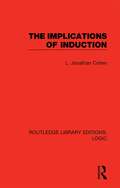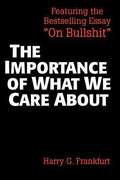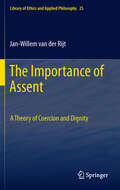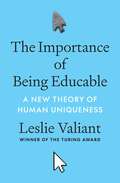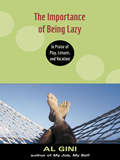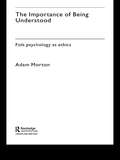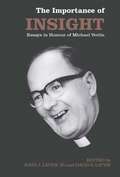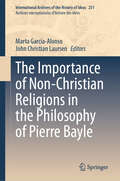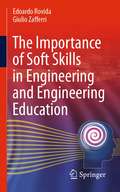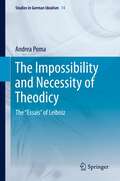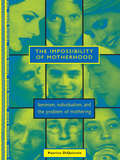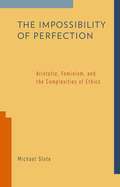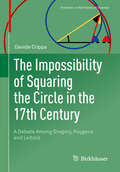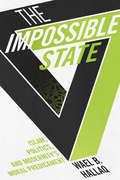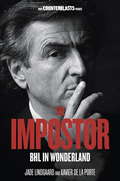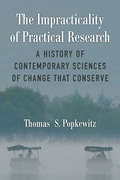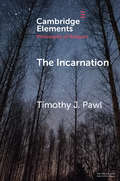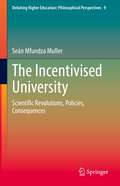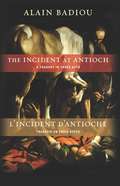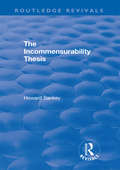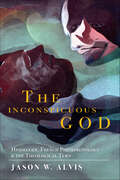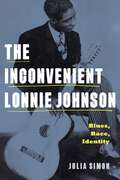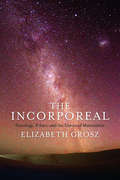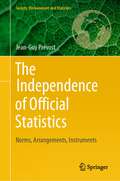- Table View
- List View
The Implications of Induction (Routledge Library Editions: Logic)
by L. Jonathan CohenOriginally published in 1973. This book presents a valid mode of reasoning that is different to mathematical probability. This inductive logic is investigated in terms of scientific investigation. The author presents his criteria of adequacy for analysing inductive support for hypotheses and discusses each of these criteria in depth. The chapters cover philosophical problems and paradoxes about experimental support, probability and justifiability, ending with a system of logical syntax of induction. Each section begins with a summary of its contents and there is a glossary of technical terms to aid the reader.
The Importance Of What We Care About: Philosophical Essays
by Harry G. FrankfurtThis volume is a collection of thirteen seminal essays on ethics, free will, and the philosophy of mind. The essays deal with such central topics as freedom of the will, moral responsibility, the concept of a person, the structure of the will, the nature of action, the constitution of the self, and the theory of personal ideals. By focusing on the distinctive nature of human freedom, Professor Frankfurt is ale to explore fundamental problems of what it is to be a person and of what one should care about in life.
The Importance of Assent
by Jan-Willem Van der RijtThe view that persons are entitled to respect because of their moral agency is commonplace in contemporary moral theory. What exactly this respect entails, however, is far less uncontroversial. In this book, Van der Rijt argues powerfully that this respect for persons' moral agency must also encompass respect for their subjective moral judgments - even when these judgments can be shown to be fundamentally flawed. Van der Rijt scrutinises the role persons' subjective moral judgments play within the context of coercion and domination. His fresh, original analysis of Kant's third formulation of the Categorical Imperative reveals how these judgments are intimately connected to a person's dignity. The result is an insightful new account of coercion, a novel Kantian reformulation of the republican notion of non-domination and a compelling, innovative argument in favour of retributive justice. "In this admirably clear and insightful work, Van der Rijt develops an original account of coercion and dignity. On the basis of his analysis of the relation between these two concepts, he also provides an intriguing new angle on the nature of republicanism. I recommend this book to anyone interested in freedom and power and their roles in normative political theory." Ian Carter - University of Pavia "In this carefully argued and original study Jan-Willem van der Rijt offers an analysis of coercion, a broadly Kantian argument that coercion is an affront to dignity, and an illuminating contrast with Philip Pettit's republicanism. A most welcome contribution." Thomas E. Hill, Jr. - University of North Carolina at Chapel Hill "Jan-Willem van der Rijt has written a well argued, original book that will prove to be extremely helpful for the philosophical inquiry of the relationship between coercion and human dignity as well as for the assessment of republicanism and its consequences." Ralf Stoecker - University of Potsdam
The Importance of Being Educable: A New Theory of Human Uniqueness
by Leslie ValiantIn the age of AI, why our future depends on better understanding what makes us humanWe are at a crossroads in history. If we hope to share our planet successfully with one another and the AI systems we are creating, we must reflect on who we are, how we got here, and where we are heading. The Importance of Being Educable puts forward a provocative new exploration of the extraordinary facility of humans to absorb and apply knowledge. The remarkable &“educability&” of the human brain can be understood as an information processing ability. It sets our species apart, enables the civilization we have, and gives us the power and potential to set our planet on a steady course. Yet it comes hand in hand with an insidious weakness. While we can readily absorb entire systems of thought about worlds of experience beyond our own, we struggle to judge correctly what information we should trust.In this visionary book, Leslie Valiant argues that understanding the nature of our own educability is crucial to safeguarding our future. After breaking down how we process information to learn and apply knowledge, and drawing comparisons with other animals and AI systems, he explains why education should be humankind&’s central preoccupation.Will the unique capability that has been so foundational to our achievements and civilization continue to drive our progress, or will we fall victim to our vulnerabilities? If we want to play to our species&’ great strength and protect our collective future, we must better understand and prioritize the vital importance of being educable. This book provides a road map.
The Importance of Being Human: Some Aspects of the Christian Doctrine of Man (Bampton Lectures in America)
by E. L. Mascall"Whatever judgement may be passed on the manner of its treatment, it will hardly be denied that the subject which I have chosen for this book--man, his nature, his end, his predicament, his resources--is of peculiar relevance at the present day, when the human race is confronted simultaneously with greater possibilities of material achievement and with greater dangers to its very existence than at any other time in its recorded history. A note of irony is added by the fact that Christian theologians themselves are far from agreement upon the basic issues, though it is to be hoped that sympathetic discussion may reveal their divergences to be less than they have sometimes thought them to be. Indeed, I am not without hope that the present book, which was originally delivered as the Bampton Lectures for 1958 at Columbia University in the City of New York, may contribute in some degree to this much to be desired rapprochement. The situation being what it is, however, it may be well to make it plain at the outset that the standpoint from which the subject is discussed is that of a Catholic theologian of the Anglican allegiance."
The Importance of Being Lazy: In Praise of Play, Leisure, and Vacation
by Al GiniDrawing upon in-depth case studies of vacation habits and the observations of philosophers, writers, and sociologists such as Aristotle, Mark Twain and Thorstein Veblen, Al Gini argues why vacations are so venerated and why 'doing nothing' is a fundamental human necessity. From shopping sprees and extreme sports to the ultimate vacation - retirement - The Importance of Being lazy demonstrates that without true leisure, we are diminished as individuals and as a society.
The Importance of Being Understood: Folk Psychology as Ethics (International Library of Philosophy #1)
by Adam MortonThe Importance of Being Understood is an innovative and thought-provoking exploration of the links between the way we think about each other's mental states and the fundamentally cooperative nature of everyday life.Adam Morton begins with a consideration of 'folk psychology', the tendency to attribute emotions, desires, beliefs and thoughts to human minds. He takes the view that it is precisely this tendency that enables us to understand, predict and explain the actions of others, which in turn helps us to decide on our own course of action. This relection suggests, claims Morton, that certain types of cooperative activity are dependent on everyday psychological understanding conversely, that we act in such a way as to make our actions easily intelligible to others so that we can benefit from being understood. This idea of 'beneficial circularities' is at the core of Morton's investigation of the interdependencies between folk psychology and social behaviour: we understand each other because we have learned to make ourselves intelligible.Using examples of cooperative activities such as car driving and playing tennis, Adam Morton analyses the concepts of belief and simulation, the idea of explanation by motive, and the causal force of psychological explanation. In addition to argument and analysis, Morton also includes more speculative explorations of topics such as moral progress and presents a new point of view on how and why cultures differ.The Importance of Being Understood forges new links between ethics and the philosophy of mind and will be of interest to anyone in either field, as well as developmental psychologists.
The Importance of Insight: Essays in Honour of Michael Vertin (The Royal Society of Canada Special Publications)
by John J Liptay David S. LiptayWritten in honour of Michael Vertin the distinguished philosopher and Lonergan scholar at the University of Toronto, The Importance of Insight brings together a number of thoughtful essays by leading Lonergan scholars. These essays investigate the importance of Lonergan's articulation of insight, and how it can be applied within the fields of cognitional theory, theology, ethics, and politics. The contributors address several issues emerging from the post-Enlightenment crisis of meaning and value, as well as more specific contemporary concerns, such as the nature of Christian revelation, the articulation of Church doctrine, and the ethical training health care professionals should receive. By indicating what there is to be gained by understanding and applying insight in a number of different contexts, this collection highlights the relevance of Lonergan's thought in the contemporary intellectual and cultural milieu, and, at the same time, makes a significant contribution to the development of Lonergan's thought itself. In this way, The Importance of Insight offers a window into cutting-edge Lonergan scholarship and some of its central concerns and preoccupations.
The Importance of Non-Christian Religions in the Philosophy of Pierre Bayle (International Archives of the History of Ideas Archives internationales d'histoire des idées #251)
by John Christian Laursen Marta García-AlonsoThis book offers a fresh perspective on early modern philosophy by highlighting Pierre Bayle's engagement with non-Christian sources. If our major political, ethical, and epistemic doctrines were solely rooted in Christian genealogies, it would seem necessary to include Christianity in the European Constitution. However, this book reveals a different story. The anthropological insights gained from encounters with other lands not only enriched the ethical and political discussions of philosophers, historians, and literati, but also paralleled the incorporation of empirical data from these regions into fields like medicine, botany, or navigation. These accounts became the building blocks for ethical and political thought, a wellspring of new ideas, thereby making the understanding of other cultures and religions pivotal in reflecting upon the specificities of Europe. Pierre Bayle's work exemplifies this transformative influence.
The Importance of Soft Skills in Engineering and Engineering Education
by Edoardo Rovida Giulio ZafferriThis book explores in depth the significance of soft skills within engineering education and the profession of engineering and emphasizes the importance of integrating hard and soft skills effectively, thereby enhancing personal acumen. Among the most important soft skills are ability to communicate, courtesy, creativity, empaty, flexibility, integrity, positivity, problem solving, professionalism, resourcefulness, responsibility, a strong work ethic, and ability to work within a team. While hard skills are related to the left side of the brain and are linked to the intelligence quotient (IQ), soft skills are related to the right side of the brain and are linked to the emotional quotient (EQ). A person who fuses hard and soft skills successfully will be able to upgrade their professional behavior and become a difference maker (DM). Soft skills are of central importance in the context of Engineering 4.0, the new phase of engineering, and in Engineering 4.0 education, and this is the central focus of the book. The presented examples of the role of soft skills will also enable readers to self-evaluate, to identify those skills that require improvement, and ultimately to enhance their performance.
The Impossibility and Necessity of Theodicy
by Andrea PomaThis book provides an analytical interpretation of Leibniz's 'Essais de Théodicée' with wide-ranging references to all his works. It shows and upholds many thesis: Leibniz's rational conception of faith, his rational notion of mystery, the reformation of classical ontology, and the importance of Leibniz's thought in the tradition of the critical idealism. In his endeavor to formulate a theodicy, Leibniz emerges as a classic exponent of a non-immanentist modern rationalism, capable of engaging in a close dialogue with religion and faith. This relation implies that God and reason are directly involved in posing the challenge and that the defence of one is the defence of the other. Theodicy and logodicy are two key aspects of a philosophy which is open to faith and of a faith which is able to intervene in culture and history.
The Impossibility of Motherhood: Feminism, Individualism and the Problem of Mothering (Thinking Gender Ser.)
by Patrice DiQuinzioAn adequate analysis of experiences and situations specific to women, especially mothering, requires consideration of women's difference. A focus on women's difference, however, jeopardizes feminism's claims of women's equal individualist subjectivity, and risks recuperating the inequality and oppression of women, especially the view that all women
The Impossibility of Perfection: Aristotle, Feminism, and the Complexities of Ethics
by Michael SloteMost people think that the difficulty of balancing career and personal/family relationships is the fault of present-day society or is due to their own inadequacies. But in this major new book, eminent moral philosopher Michael Slote argues that the difficulty runs much deeper, that it is due to the essential nature of the divergent goods involved in this kind of choice. He shows more generally that perfect human happiness and perfect virtue are impossible in principle, a view originally enunciated by Isaiah Berlin, but much more thoroughly and synoptically defended here than ever before. <P><p> Ancient Greek and modern-day Enlightenment thought typically assumed that perfection was possible, and this is also true of Romanticism and of most recent ethical theory. But if, as Slote maintains, imperfection is inevitable, then our inherited categories of virtue and personal good are far too limited and unqualified to allow us to understand and cope with the richer and more complex life that characterizes today's world. And The Impossibility of Perfection argues in particular that we need some new notions, new distinctions, and even new philosophical methods in order to distill some of the ethical insights of recent feminist thought and arrive at a fuller and more realistic picture of ethical phenomena.
The Impossibility of Squaring the Circle in the 17th Century: A Debate Among Gregory, Huygens and Leibniz (Frontiers in the History of Science)
by Davide CrippaThis book is about James Gregory’s attempt to prove that the quadrature of the circle, the ellipse and the hyperbola cannot be found algebraically. Additonally, the subsequent debates that ensued between Gregory, Christiaan Huygens and G.W. Leibniz are presented and analyzed. These debates eventually culminated with the impossibility result that Leibniz appended to his unpublished treatise on the arithmetical quadrature of the circle. The author shows how the controversy around the possibility of solving the quadrature of the circle by certain means (algebraic curves) pointed to metamathematical issues, particularly to the completeness of algebra with respect to geometry. In other words, the question underlying the debate on the solvability of the circle-squaring problem may be thus phrased: can finite polynomial equations describe any geometrical quantity? As the study reveals, this question was central in the early days of calculus, when transcendental quantities and operations entered the stage. Undergraduate and graduate students in the history of science, in philosophy and in mathematics will find this book appealing as well as mathematicians and historians with broad interests in the history of mathematics.
The Impossible State: Islam, Politics, and Modernity's Moral Predicament
by Wael HallaqWael B. Hallaq boldly argues that the "Islamic state," judged by any standard definition of what the modern state represents, is both impossible and inherently self-contradictory. Comparing the legal, political, moral, and constitutional histories of premodern Islam and Euro-America, he finds the adoption and practice of the modern state to be highly problematic for modern Muslims. He also critiques more expansively modernity's moral predicament, which renders impossible any project resting solely on ethical foundations. The modern state not only suffers from serious legal, political, and constitutional issues, Hallaq argues, but also, by its very nature, fashions a subject inconsistent with what it means to be, or to live as, a Muslim. By Islamic standards, the state's technologies of the self are severely lacking in moral substance, and today's Islamic state, as Hallaq shows, has done little to advance an acceptable form of genuine Shari'a governance. The Islamists' constitutional battles in Egypt and Pakistan, the Islamic legal and political failures of the Iranian Revolution, and similar disappointments underscore this fact. Nevertheless, the state remains the favored template of the Islamists and the ulama (Muslim clergymen). Providing Muslims with a path toward realizing the good life, Hallaq turns to the rich moral resources of Islamic history. Along the way, he proves political and other "crises of Islam" are not unique to the Islamic world nor to the Muslim religion. These crises are integral to the modern condition of both East and West, and by acknowledging these parallels, Muslims can engage more productively with their Western counterparts.
The Impostor
by Xavier De La Porte Jade LindgaardHow do we explain what Perry Anderson calls "the bizarre prominence of Bernard-Henri Lévy," easily the best-known "thinker" under sixty in France? "It would," he continues, "be difficult to imagine a more extraordinary reversal of national standards of taste and intelligence than the attention accorded this crass booby in France's public sphere, despite innumerable demonstrations of his inability to get a fact or an idea straight. Could such a grotesque flourish in any other major Western culture today?"This book, based on a careful investigation comparing BHL's words with his deeds, seeks to explore the remarkable persistence of this celebrity pseudo-philosopher since he burst onto the scene in 1977. Delving into his networks in the spheres of politics, the media and big business, Lindgaard and de la Porte reveal what the success of this three-decade long imposture tells us about the degeneration of contemporary French intellectual and cultural life.About the series: Counterblasts is a new Verso series that aims to revive the tradition of polemical writing inaugurated by Puritan and leveller pamphleteers in the seventeenth century, when in the words of one of them, Gerard Winstanley, the old world was "running up like parchment in the fire." From 1640 to 1663, a leading bookseller and publisher, George Thomason, recorded that his collection alone contained over twenty thousand pamphlets. Such polemics reappeared both before and during the French, Russian, Chinese and Cuban revolutions of the last century. In a period of conformity where politicians, media barons and their ideological hirelings rarely challenge the basis of existing society, it's time to revive the tradition. Verso's Counterblasts will challenge the apologists of Empire and Capital.
The Impracticality of Practical Research: A History of Contemporary Sciences of Change That Conserve
by Thomas S. PopkewitzThere is an alluring desire that research should lead us to find the practical knowledge that enables people to live a good life in a just and equitable society. This desire haunted the 19th century emergence of the social sciences as a discipline, then became more pronounced in the postwar mobilizations of research. Today that desire lives on in the international assessments of national schools and in the structure of professional education, both of which influence government modernization of schools and also provide for people’s well-being. American policy thus reflects research in which reforms are verified by “scientific, empirical evidences” about “what works” in experiments, and “will work” therefore in society. The book explores the idea that practical and useful knowledge changes over time, and shows how this knowledge has been (re)visioned in contemporary research on educational reform, instructional improvement, and professionalization. The study of science draws on a range of social and cultural theories and historical studies to understand the politics of science, as well as scientific knowledge that is concerned with social and educational change. Research hopes to change social conditions to create a better life, and to shape people whose conduct embodies these valued characteristics—the good citizen, parent, or worker. Yet this hope continually articulates the dangers that threaten this future. Thomas Popkewitz explores how the research to correct social wrongs is paradoxically entangled with the inscription of differences that ultimately hamper the efforts to include.
The Incarnation (Elements in the Philosophy of Religion)
by Timothy J. PawlThe Doctrine of the Incarnation, that Jesus Christ was both truly God and truly human, is the foundation and cornerstone of traditional Christian theism. And yet, this traditional teaching appears to verge on incoherence. How can one person be both God, having all the perfections of divinity, and human, having all the limitations of humanity? This is the fundamental philosophical problem of the incarnation. Perhaps a solution is found in an analysis of what the traditional teaching meant by person, divinity, and humanity, or in understanding how divinity and humanity were united in a single person? This Element presents that traditional teaching, then returns to the incoherence problem to showcase various solutions that have been offered to it.
The Incentivised University: Scientific Revolutions, Policies, Consequences (Debating Higher Education: Philosophical Perspectives #9)
by Seán Mfundza MullerThe core thesis of this book is that to understand the implications of incentive structures in modern higher education, we require a deeper understanding of associated issues in the philosophy of science. Significant public and philanthropic resources are directed towards various forms of research in the hope of addressing key societal problems. That view, and the associated allocation of resources, relies on the assumption that academic research will tend towards finding truth – or at least selecting the best approximations of it. The present book builds on, and extends, contributions in philosophy and higher education to argue that this assumption is misplaced: with serious implications for modern higher education and its role in informing societal decisions and government policy. The book develops a philosophical foundation for the analysis of the connection between higher education incentives, scientific progress and societal outcomes. That in turn is used to demonstrate how the current approach to incentivising intellectual and scientific progress is likely not only to fail, but in fact to cause harm on the very dimensions it purports to improve. The arguments presented are illustrated with examples from medicine and academic economics, making the book one of the first to examine issues of scientific progress and social consequences across the human and social sciences. In doing so, it develops a novel critique of modern economics that in turn provides a more philosophically substantive foundation for popular critiques of economics than has existed to date.
The Incident at Antioch / L’Incident d’Antioche: A Tragedy in Three Acts / Tragédie en trois actes (Insurrections: Critical Studies in Religion, Politics, and Culture)
by Alain BadiouThe Incident at Antioch is a key play marking Alain Badiou's transition from classical Marxism to a "politics of subtraction" far removed from party and state. Written with striking eloquence and extraordinary poetic richness, and shifting from highly serious emotional and intellectual drama to surreal comic interlude, the work features statesmen, workers, and revolutionaries struggling to reconcile the nature and practice of politics.This bilingual edition presents L'Incident d'Antioche in its original French and, on facing pages, an expertly executed English translation. Badiou adds a special preface, and an introduction by the scholar Kenneth Reinhard connects the play to Paul Claudel's The City, Saint Paul and the early history of the Church, and the innovative mathematical thinking of Paul Cohen. The translation includes Susan Spitzer's extensive notes clarifying allusions and quotations and hinting at Badiou's intentions. An interview with Badiou encompasses the play's settings, themes, and events, as well as his ongoing literary and conceptual experimentation on stage and off.
The Incommensurability Thesis (Routledge Revivals)
by Howard SankeyOriginally published in 1994, The Incommensurability Thesis is a critical study of the Incommensurability Thesis of Thomas Kuhn and Paul Feyerabend. The book examines the theory that different scientific theories may be incommensurable because of conceptual variance. The book presents a critique of the thesis and examines and discusses the arguments for the theory, acknowledging and debating the opposing views of other theorists. The book provides a comprehensive and detailed discussion of the incommensurability thesis.
The Inconspicuous God: Heidegger, French Phenomenology & the Theological Turn (Indiana Series in the Philosophy of Religion)
by Jason W. AlvisDominique Janicaud once famously critiqued the work of French phenomenologists of the theological turn because their work was built on the seemingly corrupt basis of Heidegger's notion of the inapparent or inconspicuous. In this powerful reconsideration and extension of Heidegger's phenomenology of the inconspicuous, Jason W. Alvis deftly suggests that inconspicuousness characterizes something fully present and active, yet quickly overlooked. Alvis develops the idea of inconspicuousness through creative appraisals of key concepts of the thinkers of the French theological turn and then employs it to describe the paradoxes of religious experience.
The Inconvenient Lonnie Johnson: Blues, Race, Identity (American Music History)
by Julia SimonLonnie Johnson is a blues legend. His virtuosity on the blues guitar is second to none, and his influence on artists from T-Bone Walker and B. B. King to Eric Clapton is well established. Yet Johnson mastered multiple instruments. He recorded with jazz icons such as Duke Ellington and Louis Armstrong, and he played vaudeville music, ballads, and popular songs.In this book, Julia Simon takes a closer look at Johnson’s musical legacy. Considering the full body of his work, Simon presents detailed analyses of Johnson’s music—his lyrics, technique, and styles—with particular attention to its sociohistorical context. Born in 1894 in New Orleans, Johnson's early experiences were shaped by French colonial understandings of race that challenge the Black-white binary. His performances call into question not only conventional understandings of race but also fixed notions of identity. Johnson was able to cross generic, stylistic, and other boundaries almost effortlessly, displaying astonishing adaptability across a corpus of music produced over six decades. Simon introduces us to a musical innovator and a performer keenly aware of his audience and the social categories of race, class, and gender that conditioned the music of his time. Lonnie Johnson’s music challenges us to think about not only what we recognize and value in “the blues” but also what we leave unexamined, cannot account for, or choose not to hear. The Inconvenient Lonnie Johnson provides a reassessment of Johnson’s musical legacy and complicates basic assumptions about the blues, its production, and its reception.
The Incorporeal: Ontology, Ethics, and the Limits of Materialism
by Elizabeth GroszPhilosophy has inherited a powerful impulse to embrace either dualism or a reductive monism—either a radical separation of mind and body or the reduction of mind to body. But from its origins in the writings of the Stoics, the first thoroughgoing materialists, another view has acknowledged that no forms of materialism can be completely self-inclusive—space, time, the void, and sense are the incorporeal conditions of all that is corporeal or material. In The Incorporeal Elizabeth Grosz argues that the ideal is inherent in the material and the material in the ideal, and, by tracing its development over time, she makes the case that this same idea reasserts itself in different intellectual contexts.Grosz shows that not only are idealism and materialism inextricably linked but that this "belonging together" of the entirety of ideality and the entirety of materiality is not mediated or created by human consciousness. Instead, it is an ontological condition for the development of human consciousness. Grosz draws from Spinoza's material and ideal concept of substance, Nietzsche's amor fati, Deleuze and Guattari's plane of immanence, Simondon's preindividual, and Raymond Ruyer's self-survey or autoaffection to show that the world preexists the evolution of the human and that its material and incorporeal forces are the conditions for all forms of life, human and nonhuman alike. A masterwork by an eminent theoretician, The Incorporeal offers profound new insight into the mind-body problem
The Independence of Official Statistics: Norms, Arrangements, Instruments (Society, Environment and Statistics)
by Jean-Guy PrévostThis book explores the independence of official statistics and describes the various legal and professional norms, institutional arrangements, instruments and practices that statisticians have developed over recent decades to protect their work from political interference. It argues that this ‘drive for independence’, which saw the replication of these norms, arrangements, and instruments across countries, was largely led by the international epistemic community of statisticians, and it identifies some of the paths and processes that enabled this drive.The study conducts an overall, multi-dimensional, and detailed comparative examination of the thirty-eight OECD countries’ norms, arrangements, and practices regarding the institutional and professional independence of official statistics. For that purpose, several dimensions have been surveyed and an index has been built that allows patterns and clusters to be uncovered among the OECD countries, shedding light on the variations that can be observed from one subgroup of countries to another.The issue of the independence of official statistics has been at the heart of several recent statistical controversies, including that of Greece’s debt, censuses in Canada and the United States, the Argentinian cost of living index, and some recent cases of resignation or dismissal of senior statisticians in various countries. Such independence has been a major topic of discussion in the epistemic community since the turn of the century, and concerns have also been addressed more widely, in the media. The subject of the book is particularly relevant as official statistics also play a significant role in monitoring the progress of the United Nations’ Sustainable Development Goals. This book will appeal to anyone interested in the topic of official statistics and to students of government in general.
